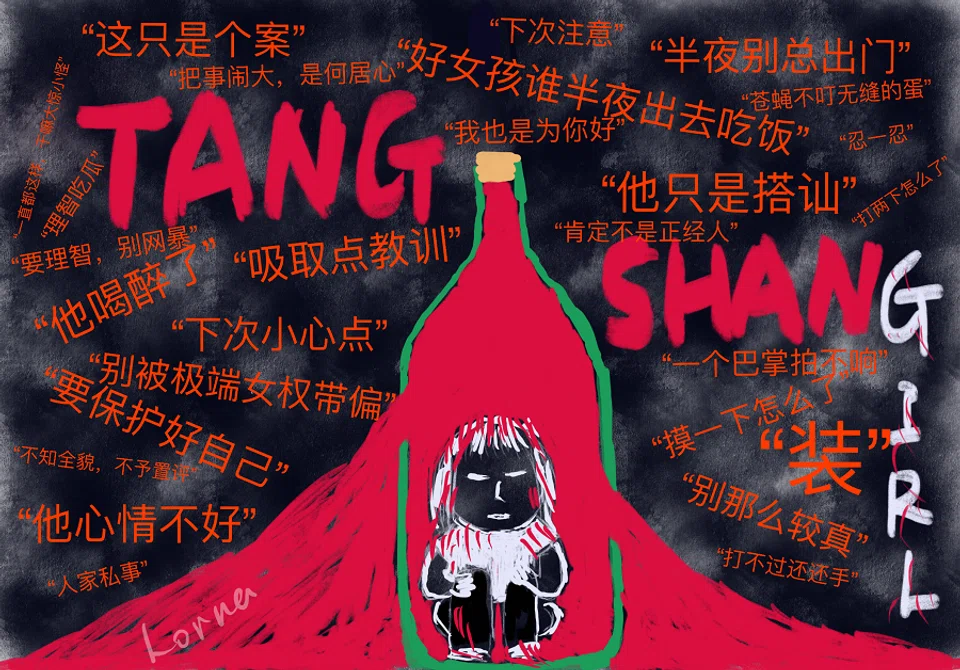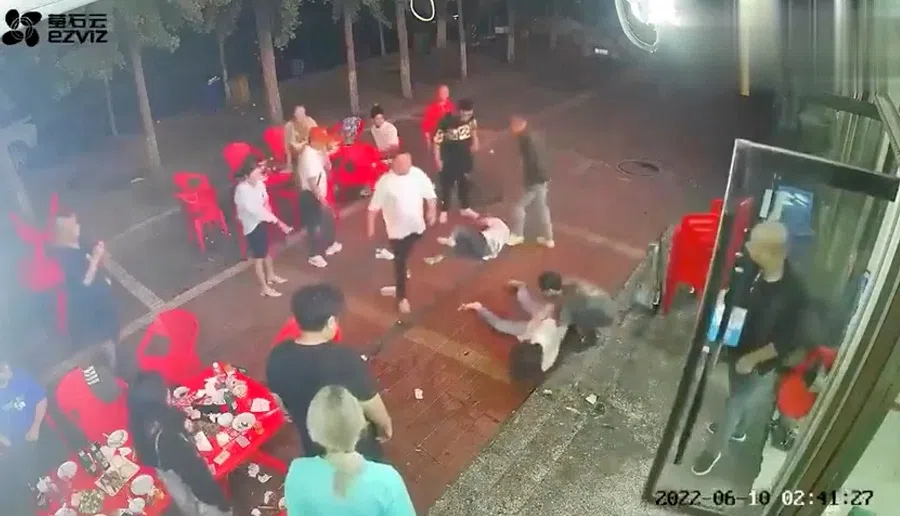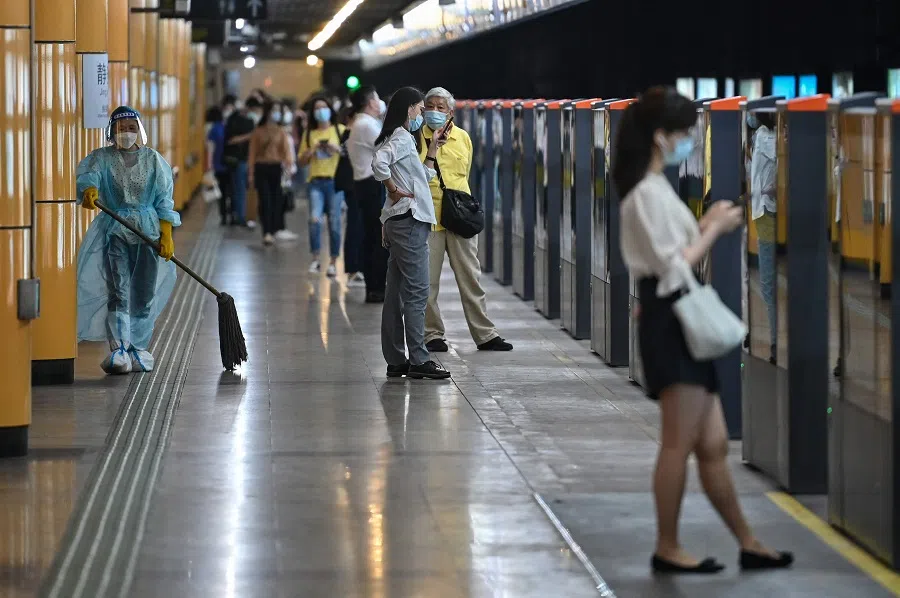A personal account of Tangshan's dreadful societal culture
The Tangshan assault case unearths deeper societal issues such as an insidious guanxi culture that has condoned the practice of turning a blind eye. Worse, ordinary folk no longer even bat an eyelid at such "norms" anymore. When that happens, is the recent violence enough to jolt society and the authorities to do things differently?

As a native of Tangshan, never did I imagine that my city would make it to the top search of every social media platform one day. At first, some social media outlets tagged the incident as "one man flirted with a woman at a restaurant and got into a fight". I took it at face value and clicked just to see what it was all about. To my horror, I ended up being traumatised.
To recap, seven men and two women violently assaulted four women at a restaurant. The perpetrators pummelled the poor women with beer bottles and savagely kicked their heads, stomachs and behinds. The few women who tried to rescue the victims got beaten up as well. Many people cried after watching this surveillance footage because the violence was too cruel and bloody and the victims utterly helpless.
This obscene footage made it to the top search on Weibo but disappeared within a week. Unsurprisingly, victim-blaming comments soon popped up: "Decent women would never eat outside at midnight. Why did the women fight against the men? He was just drunk. Be careful next time. They must know each other and have private matters to settle between them."
However, it turns out that the victims did not know the perpetrators at all. As shown in the video, the main perpetrator sexually assaulted the girl in the white T-shirt, and she told him to back off. Then the male gangsters hit the girls with the chairs and crockery in the room and dragged them out of the restaurant to continue their savage acts.

Fortunately, such clichéd victim-blaming can't hoodwink Chinese netizens anymore. Most people condemned this barbaric act and demanded that the Tangshan police bring the gangsters to justice.
Surprisingly, the police did not catch the perpetrators immediately, and four of them even escaped out of Tangshan to Jiangsu province. With the weight of public opinion bearing down on them, the Tangshan Police finally caught the nine perpetrators.
... the crux of the issue is that the gangsters only attacked female customers at the restaurant, be they the initial victims or those on the scene.
Violence that touches raw nerves of gender and politics
If you think that this is the end of the story, it's actually just the beginning. This is not the first violent act committed by the gangsters. What's ridiculous is that they always seem to be able to escape punishment despite their deeds. At this point, the major theme of the Tangshan incident becomes clear: some officials of the local government of Tangshan must be the "protective umbrella" (baohusan; 保护伞) of vicious powers.
Some netizens later pointed out that the Tangshan incident is not a gender war but a political issue. I agree that anyone can become a victim when when faced with gangsters. But, as the video made clear, the crux of the issue is that the gangsters only attacked female customers at the restaurant, be they the initial victims or those on the scene.

To some extent, their violence derives from the age-old patriarchal ideology pervading Tangshan: women should not go out at midnight, and men have the power to discipline the other sex.
This incident is just the tip of the iceberg of the extent of patriarchy that exists in Tangshan. Likewise, rural women in Tangshan cannot inherit land as men do. Parents in the urban areas usually give their possessions to sons only. On important holidays, married women who return to their own parents' homes are thought of badly. These absurd social norms have been passed down from generation to generation. If you cannot put up with such ridiculous gender discrimination, there is only one way out - run away.
When they were harassed by the gangsters, which we call heishehui (黑社会), the first choice was not to call the police, but to seek help from someone powerful, or what we call zhaoren (找人).
Guanxi a means of survival
Patriarchy is not only a gender issue. As seen from the Tangshan incident, what scares the netizens most is the reckless behaviour of the gangsters and the incompetency of the local government. For years, China has embraced the rule of law, but the Chinese dream of building a society that abides by the law has been shattered overnight in Tangshan. Honestly, though I am furious about the violence of the gangsters, the reaction of the local government or police is not something new to me.
Just imagine that you are born in Tangshan, like me. My parents were small business owners who sold fruits on the street in the 1990s. When they were harassed by the gangsters, which we call heishehui (黑社会), the first choice was not to call the police, but to seek help from someone powerful, or what we call zhaoren (找人). By relying on networks or money-giving, one could fob off the harassment by gangsters.
In these unhealthy circumstances, people eventually become complicit in the practice of networking or guanxi. They start getting used to abnormal norms, and do them gratefully and even submissively too.

It seemed then that one needed guanxi (关系; social networking often with bribery involved) to survive in Tangshan, whether to be admitted to a public kindergarten, for kids to be well taken care of by the teachers in school, or to find a decent job.
The "hereditary system" is the best phrase that I can use to describe the job market in Tangshan: if your parents are officials, it is highly likely that you will be an official too. But if you're just someone from an ordinary family, it's likely that you'd follow the same route as your parents.
If you're lucky, which means that your parents do not prefer boys over girls and spare no effort to push you to study hard, you may leave your hometown with their blessings, like me. In a city like Tangshan which keeps much to itself, outsiders may not find a way in.
The golden rule of guanxi culture is to reduce big troubles into small ones and small ones into nothing at all, which is also the way that the local government operates. The police or officials would persuade you to drop the case or ignore it when you try to defend yourself. If not, some strange but seemingly powerful people would call you and advise you to be "more mature" about the situation. Only nerds and fools seek justice or equality. Smarter ones rely on guanxi and money. In these unhealthy circumstances, people eventually become complicit in the practice of networking or guanxi. They start getting used to abnormal norms, and do them gratefully and even submissively too.
Ironically, the Tangshan Police launched Operation Thunderstorm to fight against the gangsters. It seems that the police are determined to protect Tangshan citizens. But should the perpetrators have committed the crime in the first place? Why should we be grateful for the police doing something they're supposed to? No wonder some netizens mocked Operation Thunderstorm thus: "In June 2022, the Tangshan Police Station was finally established."
Related: Chinese public safety fears rise after Tangshan assault case | China's forced drinking culture a submissive test for Chinese women | Why Chinese women are unwilling to give birth | A Chinese woman's status and the one-child policy | Rape accusations in China: When wives protect their errant husbands





